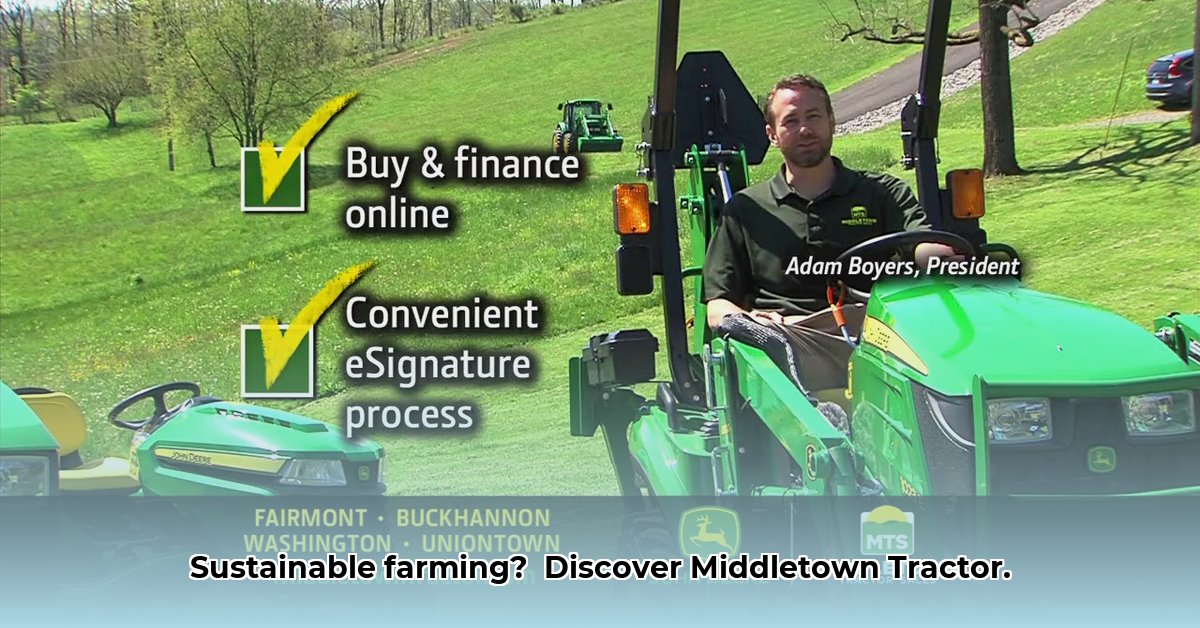
Middletown Tractor, a family-owned business operating in Buckhannon, West Virginia since 1952, stands as a pillar of the local agricultural community. Its enduring success, built over seven decades, reflects a capacity for adaptation and a profound understanding of the unique needs of West Virginia farmers. This case study examines Middletown Tractor's operational model, identifying its strengths and weaknesses, and proposing actionable strategies for future growth and sustainability within the evolving agricultural landscape. For comparison, see reviews of other brands like Massey Ferguson tractors.
A Deep Dive into Middletown Tractor's Business Model
Middletown Tractor's longevity stems from its comprehensive approach to serving its clients. The company's business model extends far beyond the simple sale of farm equipment. As the state's oldest John Deere dealer, they leverage a trusted brand, yet their success is rooted in a multifaceted service offering. This includes sales, a robust parts inventory valued at over $1 million, and crucially, mobile repair services – minimizing costly downtime for farmers. This integrated approach fosters strong customer relationships and ensures operational continuity for their clientele. How effectively does this strategy compare to competitors in similar markets? Further research into market share and service utilization rates could provide comparative data to strengthen this analysis.
Core Strengths and Persistent Challenges
Middletown Tractor possesses several key strengths. Its deep-rooted community ties have cultivated customer loyalty and trust. The comprehensive service offering provides unparalleled convenience, and the extensive parts inventory directly translates to increased operational efficiency for farmers. The company’s customer-centric approach further fosters lasting relationships. However, certain weaknesses require attention. A significant risk lies in the potential over-reliance on John Deere equipment. Diversifying product offerings would mitigate this dependence and open opportunities in emerging markets. Similarly, streamlining the return policy could improve customer satisfaction and reduce friction points.
Navigating Technological Advancements and Future Growth
The agricultural sector is undergoing a rapid technological transformation. Precision agriculture and data analytics are reshaping farming practices, offering both opportunities and challenges. Middletown Tractor must adapt to remain competitive. A pivotal strategic move would be to invest in employee training programs focused on the emerging technologies of precision agriculture, including data analytics and precision farming techniques. Such training would ensure the workforce can effectively utilize and support these new technologies, thereby improving efficiency and the range of services offered. Further enhancing this approach, strategic partnerships with agricultural technology companies could provide access to additional expertise and an expanded range of services.
Actionable Recommendations: A Path Forward
To maintain its leading position, Middletown Tractor should pursue several strategic actions. These can be categorized into short-term and long-term initiatives for both the company itself and its stakeholders.
Short-Term Actions (within 1 year):
- Enhance Online Presence: Improve website usability and SEO optimization to attract new customers.
- Simplify Return Policy: Streamline the return process to enhance customer satisfaction.
Long-Term Actions (beyond 1 year):
- Invest in Technology Training: Implement comprehensive employee training programs on precision agriculture technologies. This should incorporate both theoretical knowledge and hands-on experience, utilizing simulation software to practice application in a low-risk environment. A target completion rate of 95% for all employees within two years should be set.
- Foster Strategic Partnerships: Collaborate with agricultural technology companies to offer new services. Explore cooperative marketing strategies and joint ventures to expand market reach and access cutting-edge expertise.
Risk Mitigation: A Proactive Approach
Proactive risk management is critical for long-term success. Middletown Tractor faces risks related to economic downturns, competition and technological change. Mitigation strategies should focus on diversifying the customer base; offering flexible financing options; investing in ongoing employee training; and strategically partnering with technology providers. Building strong and diverse supplier relationships will reduce reliance on single sources and enhance supply chain resilience.
Pivotal Points:
- Middletown Tractor’s enduring success is founded on its comprehensive service model, strong community ties, and customer-centric approach.
- Continued success demands proactive adaptation to technological advancements in precision agriculture.
- Strategic risk management and stakeholder collaboration are essential for navigating the challenges of an evolving agricultural landscape.
Middletown Tractor's seven decades of success are testament to its dedication to the community and its clients. By strategically addressing the challenges and embracing the opportunities presented by technological advancements, Middletown Tractor can continue to thrive for decades to come.